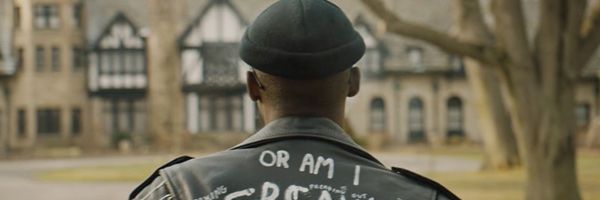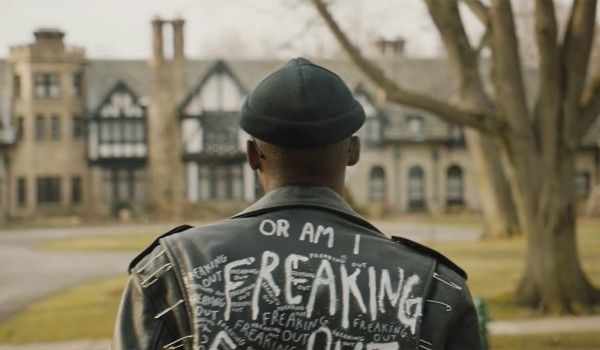When Richard Wright’s novel Native Son was published in 1940, it was understandably met with a mix of acclaim and controversy. The book aims to not only chronicle the African-American experience, but how America at large shapes and dictates the lives of African-Americans living in it—it touched on a sense of stark inevitability for many at the time. Updating the book for the 21st century is an ambitious if admirable task, and while director Rashid Johnson in his feature debut shows tremendous talent and promise behind the camera, and the lead performance by Ashton Sanders is downright stunning, the film’s strict adherence to the book’s shocking twists and turns result in a frustratingly uneven and incongruous experience.
Johnson’s adaptation of Native Son, written by Suzan-Lori Parks, updates the story to a present day setting in Chicago. Bigger “Big” Thomas (Sanders) is the oldest child of an impoverished single mother (Sanaa Lathan) and delights in his own sense of anarchy. Big doesn’t listen to Nas or Kanye West, and instead fancies himself a fan of straight punk music (he loves Bad Brains) and classical compositions by legends like Beethoven. He has green hair, paints his nails black, and wears a striking leather jacket with writing all over it. But while Big clearly enjoys being the “wildcard,” he still cares about being successful and mostly staying out of trouble. When his friend tries to convince him to rob a convenience store, he repeatedly rebuffs him, insisting he’s not really about that.
When presented with the opportunity to serve as a driver for a prominent white family in town, the Daltons, Big nails the interview. He’s engaging and polite, but doesn’t appear to be putting on a good face for show. He’s presenting his best self, sure, but it never feels like he’s explicitly betraying his sense of identity. And when the family’s eldest daughter Mary (Margaret Qualley) pushes Big to take her not to school but to gatherings led by her politically outspoken boyfriend Jan (Nick Robinson), he tries to push back, wanting to stay out of trouble.
Johnson does a tremendous job of relaying the fear and tension within Big throughout the film. Seemingly innocuous scenes are scored as if they’re from a horror movie, ratcheting up the tension not in a foreboding manner, but in a way that allows the audience to empathize with Big’s constant anxiety and fear working in the “white” world. Striking cinematography and shot design courtesy of DP Matthew Libatique fills each frame with subtext, once again allowing the audience inside Big’s head and heart in an artful manner.
Midway through the film, however, an event that is no doubt unforgettable for book readers occurs, and unfortunately the movie never recovers. I won’t spoil it in this review, but suffice it to say my feelings towards the film and Big specifically did a complete 180. The event is meant to underline the themes present in Wright’s novel, and indeed the book takes things even further, but in practice nothing in the first half of the film would lead you to believe Big would act and continue on in the manner he does throughout the second half of the movie. It’s a miscalculation of tone, and while the artful nature of Johnson’s filmmaking remains striking, the story never really recovers on a base character level.
That said, the performances throughout the film—especially from Sanders—are impressive. Sanders was first introduced to audiences in Best Picture-winner Moonlight, but in Native Son he more than proves capable of carrying a film all his own. There’s a charming swagger to the way Sanders carries Big that is downright transfixing, but the actor also threads an underlying thread of fear and insecurity just beneath the surface. The arc that Big follows presents a nearly impossible task for any actor, but Sanders performs admirably, and you can’t take your eyes off of him even when the story is taking some huge leaps. If Beale Street Could Talk star KiKi Layne is also impressive as Big’s girlfriend, and Qualley nails the “spoiled but not completely insufferable” nature of Mary.
Native Son is clearly exploring the African-American experience in bold, ambitious ways, and I really do admire the swings that Johnson takes. Being both unfamiliar with the source material and the African-American experience myself I admit this is a film that may work for some people better than others. But given the material presented, and the character established through the first half of the film, I simply couldn’t reconcile the Big I saw in the second half with the character I initially grew to like. And maybe that’s the point. That race relations and circumstances can so significantly change a person as to render them unrecognizable. But as a viewing experience, Native Son proves incongruous.
Johnson clearly has a point of view here, and the filmmaking throughout the movie is tremendously impressive, so I’m eager to see the acclaimed artist continue making films. Native Son is a big, unabashed swing of a movie, and even if I don’t think the film works as a whole, it at least sparks discussion and strong feelings. I’d much rather watch an interesting film that doesn’t completely work than an uninteresting film that proves forgettable. And Native Son is nothing if not unforgettable.
Rating: C+
Native Son does not currently have a release date but will be released by HBO Films later this year.


